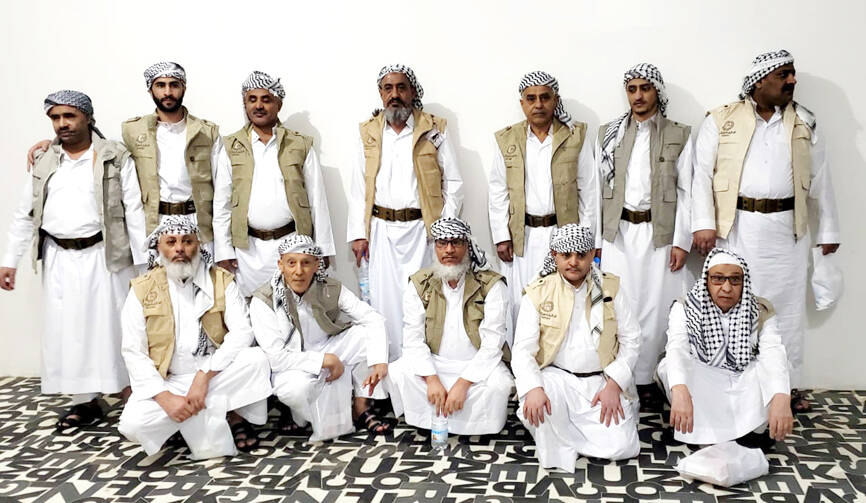Saudi Arabia on Saturday released more than a dozen war prisoners to their rivals, the Houthi rebels in Yemen, a Houthi official said.
The release came as Omani officials arrived in the Yemeni capital as part of international efforts to end Yemen’s years-long conflict.
Abdul-Qader el-Murtaza, a Houthi official in charge of prisoner exchange talks in Yemen’s conflict, said 13 Houthi prisoners on Saturday arrived in the capital, Sanaa.

Photo: EPA-EFE
He said the prisoners were released in exchange for a Saudi prisoner the Houthis freed, but did not indicate when the rebels released the Saudi prisoner.
Saturday’s release was part of a UN-brokered deal which Yemen’s warring parties struck last month and includes the release of nearly 900 prisoners from both sides, el-Murtaza said.
The UN-brokered deal is scheduled to be implemented this month.
Yemen’s conflict began in 2014, when the Houthis seized Sana’a and much of the country’s north, ousting the internationally recognized government that fled to the south then into exile in Saudi Arabia.
The Houthi move prompted a Saudi-led coalition to intervene months later in a bid to restore the internationally recognized government to power.
The conflict in the past few years has turned into a regional proxy war between Saudi Arabia and Iran. It has killed more than 150,000 people, including fighters and civilians, and created one of the world’s worst humanitarian disasters.
Omani officials, meanwhile, landed in Sana’a for talks with Houthi officials in the latest efforts to renew a ceasefire deal that expired in October last year, Houthi chief negotiator Mohammed Abdul-Salam said.
Oman has for years hosted talks between the Iranian-backed Houthis and Saudi Arabia. The talks have been intensified since the warring sides failed to renew a UN-brokered ceasefire in October.
The Houthi-run al-Masirah television network reported that a Saudi delegation, led by the Saudi ambassador to Yemen, Mohammed bin Saeed Al-Jaber, would visit Sana’a yesterday, also for talks with the Houthis.
The negotiations in Oman’s capital, Muscat, focused on preventing all-out fighting after the ceasefire collapsed, and laying out a path for a negotiated end to Yemen’s civil war.
These talks have gained momentum in recent weeks after Saudi Arabia reached an agreement with Iran to restore their diplomatic ties after a seven-year rift. The Iran-Saudi deal, announced in Beijing on March 10, has invigorated hopes of a settlement to Yemen’s conflict.

Packed crowds in India celebrating their cricket team’s victory ended in a deadly stampede on Wednesday, with 11 mainly young fans crushed to death, the local state’s chief minister said. Joyous cricket fans had come out to celebrate and welcome home their heroes, Royal Challengers Bengaluru, after they beat Punjab Kings in a roller-coaster Indian Premier League (IPL) cricket final on Tuesday night. However, the euphoria of the vast crowds in the southern tech city of Bengaluru ended in disaster, with Indian Prime Minister Narendra calling it “absolutely heartrending.” Karnataka Chief Minister Siddaramaiah said most of the deceased are young, with 11 dead

By 2027, Denmark would relocate its foreign convicts to a prison in Kosovo under a 200-million-euro (US$228.6 million) agreement that has raised concerns among non-governmental organizations (NGOs) and residents, but which could serve as a model for the rest of the EU. The agreement, reached in 2022 and ratified by Kosovar lawmakers last year, provides for the reception of up to 300 foreign prisoners sentenced in Denmark. They must not have been convicted of terrorism or war crimes, or have a mental condition or terminal disease. Once their sentence is completed in Kosovan, they would be deported to their home country. In

Brazil, the world’s largest Roman Catholic country, saw its Catholic population decline further in 2022, while evangelical Christians and those with no religion continued to rise, census data released on Friday by the Brazilian Institute of Geography and Statistics (IBGE) showed. The census indicated that Brazil had 100.2 million Roman Catholics in 2022, accounting for 56.7 percent of the population, down from 65.1 percent or 105.4 million recorded in the 2010 census. Meanwhile, the share of evangelical Christians rose to 26.9 percent last year, up from 21.6 percent in 2010, adding 12 million followers to reach 47.4 million — the highest figure

LOST CONTACT: The mission carried payloads from Japan, the US and Taiwan’s National Central University, including a deep space radiation probe, ispace said Japanese company ispace said its uncrewed moon lander likely crashed onto the moon’s surface during its lunar touchdown attempt yesterday, marking another failure two years after its unsuccessful inaugural mission. Tokyo-based ispace had hoped to join US firms Intuitive Machines and Firefly Aerospace as companies that have accomplished commercial landings amid a global race for the moon, which includes state-run missions from China and India. A successful mission would have made ispace the first company outside the US to achieve a moon landing. Resilience, ispace’s second lunar lander, could not decelerate fast enough as it approached the moon, and the company has